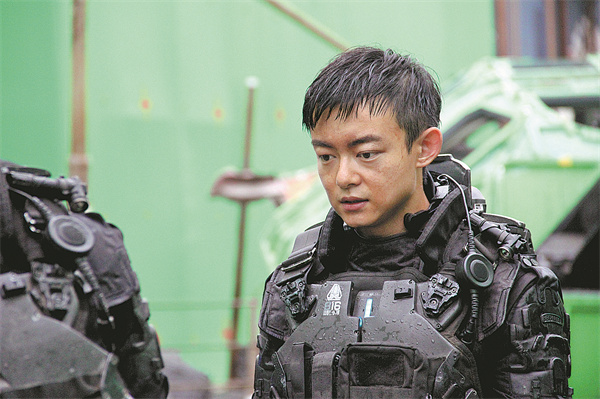

During his first week in Hengdian, considered to be the Chinese equivalent of Hollywood, Wan was quite excited. After traveling to all the major scenic areas, the reality of his financial situation began to set in. He walked into a shabby hotel and asked for the cheapest room.
"The owner led me down the stairs to a small, corner room with no window, but it cost just 25 yuan a day. I was satisfied and immediately told him, 'I want it'," he recalls.
It was a difficult start for the young man. His daily routine varied from blindly handing out his resume to casting directors, to waiting in crowds of candidates for the slightest chance of being selected as an extra. Wan also worked two temporary jobs-consecutively at a dessert shop and a barbecue restaurant-to make a living.
"The barbecue restaurant's owner was a very nice person. He introduced me to a casting director, who hired me to work as an extra for a week. For two nights in a row, I slept for just two hours and could clearly hear my heart pounding as I walked back to my hotel," says Wan.
Despite being extremely exhausted, Wan says that he remained sure about his decision and love for the movies at that time, setting himself a three-year goal to achieve his dream. In the meantime, he became a heng piao, or "Hengdian drifter", a term that refers to the sizable group of young people who leave home for Hengdian to chase their dreams of becoming a movie star.
Much more fortunate than many of his fellow extras, Wan beat more than 700 applicants to be shortlisted as one of 21 people to attend an acting training program sponsored by prestigious director Derek Yee Tung-sing, a two-time best director winner at the Hong Kong Film Awards.
At the time, Yee was visiting his old friend and maverick filmmaker Tsui Hark to discuss their martial arts movie Sword Master. He was attracted by the distinctive temperament of Hengdian, where modern buildings intermingle with compounds styled like ancient palaces. As night falls, the entire town looks like a scene from a time-travel movie, with extras wearing ancient costumes taking a break to play with their cellphones, or squatting to eat food from paper boxes.
Once a group of scattered mountain villages, Hengdian started to take off as a film and TV production hub in 1996 with the construction of its first film set, a 60,000-square-meter replica of over 160 buildings in the architectural style of 19thcentury Guangzhou, for director Xie Jin's The Opium War, a historical epic recounting the war that resulted in the decline of the Qing Dynasty (1644-1911).
With the rapid development of China's film and television industries, the town has built more than 30 scenic areas, over 100 soundstages and more than 2,000 sets depicting ancient dynasties and modern cities, drawing over 1,300 movie and TV production companies to establish their operations at the site. According to domestic media reports, in its heyday, two-thirds of China's costume dramas were being filmed in the town.